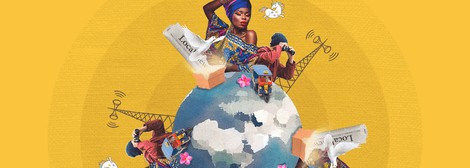Your podcast discovery platform
Curious minds select the most fascinating podcasts from around the world. Discover hand-piqd audio recommendations on your favorite topics.

piqer for: Global finds Health and Sanity Doing Good
Bangalore-based Rashmi Vasudeva's journalism has appeared in many Indian and international publications over the past decade. A features writer with over nine years of experience heading a health and fitness supplement in a mainstream Indian newspaper, her niche areas include health, wellness, fitness, food, nutrition and Indian classical Arts.
Her articles have appeared in various publications including Mint-Wall Street Journal, The Hindu, Deccan Herald (mainstream South Indian newspaper), Smart Life (Health magazine from the Malayala Manorama Group of publications), YourStory (India's media technology platform for entrepreneurs), Avantika (a noir arts and theatre magazine), ZDF (a German public broadcasting company) and others.
In 2006, she was awarded the British Print-Chevening scholarship to pursue a short-term course in new-age journalism at the University of Westminster, U.K. With a double Masters in Globalisation and Media Studies from Aarhus Universitet (Denmark), University of Amsterdam and Swansea University in Wales, U.K., she has also dabbled in academics, travel writing and socio-cultural studies. Mother to a frisky toddler, she hums 'wheels on the bus' while working and keeps a beady eye on the aforementioned toddler's antics.
When Have We Not Been A Post-Truth Society?
If you have been ranting about post-truths and alternative facts (like I have been), this article might calm you down.
Or it might not.
All of us like lies. We like the little bubbles of half-truths, untruths, myths and fictions we tell ourselves. It is just that when a professor like Yuval Noah Harari writes flatly that truth has never been high on the agenda of Homo sapiens does the, well, truth hit home.
Much has been written about post-truth post-Trump, but this article is fascinating because it looks at the whole drama with an evolutionary lens. And is written with flair, persuasive examples and wit.
The professor states it is because of our ability to create and spread myths and fictions that we cooperate with strangers, work (and believe) together and “conquer the planet”. The example he gives is telling. Can you cram 50,000 chimps in a stadium? But 50,000 humans in a stadium will sit tight because they believe in the same story about baseball. Sample this one. Can you convince a group of chimps to attack and kill stranger-chimps by just promising them chimpanzee heaven full of bananas? No chimp will ever do your bidding, while humans with their deep faith (in the absence of any evidence) will. Ironically this is also why the faithless chimps don’t rule the world.
No one understood this better than the master-manipulator Goebbels whose famous "lie told a thousand times becomes the truth" encompasses all the evolutionary research there is on the subject.
There is a striking line in the article (which is rather full of such striking lines) and it is this: "If you stick to unalloyed reality, few people will follow you."
And that really is the truth. The politicians, the fascists and the ultra-religious who have understood this are winning. And will continue to do so. The only change in 2017, as the author rightly says, is that technology has made such fictions more easily accessible and their power more potent.
So we ought to live with it as we have from the Stone Age.

Great read!
Yuval Noah Harari is a fascinating character. I just bought (unfortunately not yet read) his bestseller "Sapiens".
Here's a great podcast with him and Sam Harris: https://www.samharris....
BTW: Mark Zuckerberg is a Harari-Fan as well. What does that tell us?:)
Ideas and concepts that drive human behavior aren't usually "post-truth" and many are quite useful. Post-truth means something quite different than traditional myth making: usually emotional appeals to disregard previously culturally accepted standards of proof and analysis.
thanks for the piq. certainly a trail worth following...